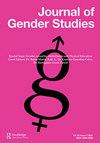Crisis epistemologies: a case for queer feminist digital ethnography
IF 1.5
3区 社会学
Q2 SOCIAL ISSUES
引用次数: 0
Abstract
ABSTRACT Crisis marks our lives more than ever before. It defines the ongoing violence of capitalism, nationalism, neoliberalism, gendered and racialized oppressions, and life in the era of the Anthropocene. In addition to this, crisis plays a crucial role in queer and trans studies, which seeks to expose the crises inherent to regimes of ‘normativity’. Within this context, this article asks – what constitutes crisis epistemologies? How can we study the unpredictable effects of ongoing crises? What are the ethical imperatives of such research? I argue that queer feminist digital ethnographies can be one method to map crisis epistemologies, for three reasons. First, the interdisciplinarity of queer feminist digital ethnographies attunes them to the messiness of crisis. Second, these ethnographies reimagine the field as a rhizomatic network, enabling a mapping of how crisis resignifies relationalities. Third, queer feminist digital ethnographies deploy practices of speculation and fabulation that trace the ongoing resignations of crises alongside building imaginations of worlds without crises, therefore acting as a tool that constructs transformative futures.危机认识论:酷儿女权主义数字人种学的案例
危机比以往任何时候都更多地标志着我们的生活。它定义了资本主义、民族主义、新自由主义、性别和种族化压迫以及人类世时代的生活。除此之外,危机在酷儿和跨性别研究中起着至关重要的作用,这些研究试图揭示“规范性”制度固有的危机。在此背景下,本文提出——危机认识论的构成是什么?我们如何研究持续危机的不可预测影响?这类研究的伦理要求是什么?我认为酷儿女权主义数字民族志可以成为绘制危机认识论的一种方法,原因有三。首先,酷儿女权主义数字人种学的跨学科性使他们适应了危机的混乱。其次,这些民族志将该领域重新想象为一个根茎网络,从而能够绘制危机如何重新定义关系的地图。第三,酷儿女权主义数字民族志运用猜测和虚构的实践,追踪危机的持续辞职,同时构建对没有危机的世界的想象,因此作为构建变革未来的工具。
本文章由计算机程序翻译,如有差异,请以英文原文为准。
求助全文
约1分钟内获得全文
求助全文
来源期刊

Journal of Gender Studies
Multiple-
CiteScore
4.40
自引率
0.00%
发文量
52
期刊介绍:
The Journal of Gender Studies is an interdisciplinary journal which publishes articles relating to gender from a feminist perspective covering a wide range of subject areas including the Social and Natural Sciences, Arts and Popular Culture. Reviews of books and details of forthcoming conferences are also included. The Journal of Gender Studies seeks articles from international sources and aims to take account of a diversity of cultural backgrounds and differences in sexual orientation. It encourages contributions which focus on the experiences of both women and men and welcomes articles, written from a feminist perspective, relating to femininity and masculinity and to the social constructions of relationships between men and women.
 求助内容:
求助内容: 应助结果提醒方式:
应助结果提醒方式:


